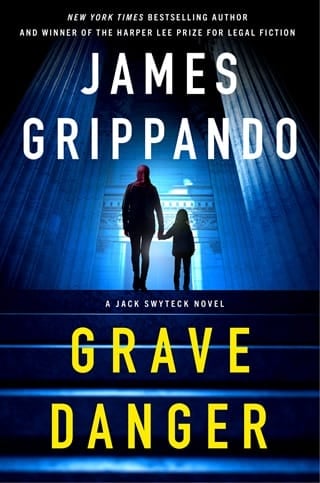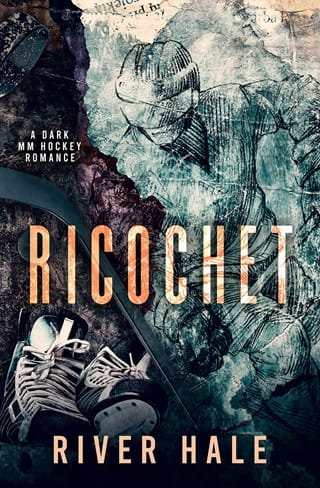Chapter 9
At 9:00 a.m., Jack and his client were in Judge Carlton’s courtroom, as ready as they could be for the promised witness: the
presiding imam from Zahra and Farid’s wedding ceremony.
The courtroom was packed, and the scene outside the courthouse had confirmed exactly what Zahra told Jack about activists
using Ava as a launching pad for broad opposition to the Iranian regime. A few demonstrators held signs asking, where is ava bazzi? But there were many others. free niloufar hamedi , referring to the woman journalist who was sentenced to six years in prison for writing about the funeral of a hijab protester.
remember armita gervand , for a teenage girl beaten to death by the morality police on the subway for not wearing a head covering. death to the dictator . The crowds were not just for Ava. Nor was the media coverage. Inside the courtroom, more than a dozen journalists filled the
first two rows of public seating. Behind them sat many of the same demonstrators Jack had seen outside the courthouse, their
voices silenced not by the Iranian regime they denounced but by courtroom etiquette. A large LCD screen was off to one side,
positioned so that the judge, lawyers, and spectators had a clear view of the witness’s virtual appearance. The screen was
black.
Farid’s counsel rose. “Your Honor, I have some unfortunate news,” said Beech. “We’ve just been informed that the witness is
unavailable at this time.”
“When will he be available?”
“We’re not sure.”
“What’s the reason for his sudden unavailability?”
“I don’t have that information.”
The judge was openly annoyed. “Ms. Beech, your client is the petitioner in this proceeding. Leading off with the imam was your idea, so you have a binary choice to make. Call your first witness, whoever that may be. Or dismiss your case.”
“Your Honor, we have a replacement witness who is available to testify via videoconference.”
Jack smelled a rat. “Your Honor, Ms. Beech is trying to pull the courtroom equivalent of a bait and switch. We scrambled on
short notice to prepare for the testimony of the imam, and now the petitioner wants to call a surprise witness.”
“It appears that my esteemed opposing counsel hasn’t handled many Hague proceedings.” Beech’s tone was condescending. “Surprise
witnesses are the norm. They appear live in court, by videoconference, by telephone, by videotaped deposition, by written
affidavits, by handwritten letters to the judge, and in every other conceivable manner.”
Jack was reminded of his earliest court appearances, right out of law school, when prosecutors seemed to think there was some
tactical advantage to calling him out as a newbie to death penalty cases. It always backfired.
“Judge, I fully understand that this is not a trial governed by the federal rules. But unless Ms. Beech is representing herself
as having learned of the imam’s unavailability literally fifteen seconds ago, the simple courtesy of a heads-up would have
been nice.”
“Let’s move on,” said the judge. “Mr. Swyteck, make whatever objections you deem necessary. Ms. Beech, call your witness.”
“The petitioner calls Sasan Sherif, MD.”
Jack checked with his client, but she had no idea who Sherif was.
An English/Farsi translator took a seat in the witness stand. The screen flickered, and the image of the witness appeared.
The blurred background gave no clue as to Dr. Sherif’s actual location, but he was wearing a white doctor’s coat, which led
Jack to guess either a hospital or other medical facility. His hair was jet-black, but his beard was a more natural-looking
salt-and-pepper mix. The oath was through the translator, as were the questions and answers, beginning with his occupation,
which explained the white coat.
“I am the head medical examiner for Tehran Province, which includes the city of Tehran.”
“How long have you held that position?”
“Five years, approximately.”
The witness described his duties, which were like those of any medical examiner in a major metropolis.
“Dr. Sherif,” said Beech, “under what circumstances does the medical examiner’s office receive a body for examination?”
“When unnatural or suspicious circumstances surround the cause of death, or if the deceased is the victim of a crime or accident.”
“Do your duties as medical examiner include the issuance of death certificates?”
“Yes.”
“Has your office ever issued a certificate of death for Ava Bazzi, whose next of kin include a husband, Mr. Farid Bazzi, and
a daughter, Yasmin Bazzi?”
Jack jumped to his feet. Farid and his counsel had apparently moved past their initial strategy of proving that Zahra had
no rights under the Hague Convention because her marriage to Farid was a fraud. The separate question of whether Ava was alive
or dead was irrelevant to the fraud argument. For whatever reason, Farid’s new witness would utter in a court of law the very
same position the Iranian government had asserted in the court of public opinion: that Ava Bazzi was still alive.
“Objection, Your Honor. Ava Bazzi has nothing to do with this proceeding.”
“Judge, the relevance will become quickly apparent,” said Beech.
“Make it very quick,” said the judge. “The witness may answer.”
The translator delivered the response. “No, the Tehran medical examiner’s office has never issued a death certificate for
Ava Bazzi.”
“Am I correct that your medical office is located in the same province as the Tehran prison, where Ms. Ava Bazzi was jailed?”
A demonstrator shouted something in Farsi from the back of the courtroom, which drew the crack of the judge’s gavel and a
stern warning.
“Order! Any further outbursts will result in immediate removal from this courtroom. Ms. Beech, I’ll give you two more questions to wrap this up.”
“I need only one. Dr. Sherif, at any time, was the body of Ava Bazzi brought to your office for examination, from the Tehran
prison or from anywhere else?”
“No. Never.”
“I have no further questions,” said Beech.
“Mr. Swyteck, do you have any cross-examination?”
“No, Your Honor. I move to strike this witness’s testimony as completely irrelevant to this proceeding.”
The judge seemed to agree. “Ms. Beech, you promised that the relevance would be quickly apparent. I must be missing something.”
“Judge, even if we assume the marriage was valid, Zahra Bazzi became a stepmother. As stepmother, she has no rights of custody
over Farid’s daughter, Yasmin. That’s the law of Iran. It’s even the law of Florida. If she has no custody rights, she has
no right to assert any defenses to child abduction under the Hague Convention. The case is over.”
Jack was fully prepared on that point of law. “Your Honor, we concede that my client is not the biological mother. But in
the eyes of the law, she is more than a stepmother. She formally and legally adopted Yasmin. An adoptive mother has the full legal rights of a biological mother.”
The judge grimaced. “I still don’t see how any of this makes the testimony of an Iranian coroner relevant to this proceeding.”
“Nor do I,” said Jack.
“It’s really quite simple,” said Beech. “Under Iranian law, if both biological parents are still alive, a stepparent’s adoption
of a stepchild is not valid unless both biological parents consent. As the medical examiner just testified, there is no evidence that Ava is dead. In the eyes of the law, Ava is a living biological parent of Yasmin who never consented to Zahra’s adoption of Yasmin. Without Ava’s consent, it is irrelevant whether Farid consented to the adoption or if his consent was obtained by Zahra’s fraud. By itself, Ava’s lack of consent renders the adoption invalid, which means that Zahra has no custody rights to Yasmin. As between Farid and Zahra, the court must order Yasmin’s return to Farid.”
The judge seemed impressed. “Ms. Beech, I give you points for creativity. Mr. Swyteck, what’s your response?”
Jack wasn’t aching to turn a courtroom battle into all-out war against the Iranian government, not to mention the US State
Department. But Farid’s “creative” new strategy made the nuclear option his only option.
“Your Honor, if this court allows the testimony of this witness to stand, you will have opened Pandora’s box. I will have
no choice but to present any and all evidence I can find to prove one point: Ava Bazzi is dead. More specifically, she was
murdered by the Iranian government.”
The courtroom erupted with cheers and applause from the demonstrators, which the judge immediately gaveled down.
“Final warning!” he bellowed. “If there is one more outburst, I will close this entire courtroom to the public.”
The courtroom fell silent—so silent that the judge’s deep sigh was picked up by the microphone, audible to all.
“Mr. Swyteck, I take your point. I’m not eager to expand the scope of this proceeding.”
Beech interjected. “Judge, you are not expanding the proceeding. You are streamlining it. In the absence of any evidence— any evidence—that Ava Bazzi is dead, Zahra Bazzi is not a lawful adoptive parent. This case is over.”
The judge paused, thinking, then spoke. “This is an important issue. My recollection under Florida law is that the consent
of both biological parents is required, if they are both alive. But I’m no expert in Iranian law.”
“Judge, it’s the same under Iranian law,” said Beech.
“You may say so, Counsel. But I don’t know that for a fact. So, here’s what we’re going to do. I will give each side until
five p.m. to deliver an affidavit from an expert in Iranian law who can answer this question. I will issue a ruling tonight.
We are adjourned until nine o’clock tomorrow morning,” he said, and the proceeding ended with a bang of his gavel.
“All rise!” called the bailiff.
The courtroom was silent until the judge disappeared through the side door to his chambers. Members of the media rushed to the rail, shouting questions at both the petitioner and the respondent. Jack led his client away from the commotion to the far side of the empty jury box, well away from the public seating, out of earshot of the media.
“How did this become all about Ava?” asked Zahra. “Does this mean I will lose?”
“I won’t lie to you,” said Jack. “It makes the case harder.”
“Because of the politics?”
Proving Ava’s death was something Jack was hoping to keep out of the Hague Convention proceeding, and not because he was trying
to accommodate the State Department’s concerns—or Andie’s.
“Not just politics,” he said. “Under the law, it’s not easy to prove that a missing person is dead. In fact, until a person
has been missing for seven years, the legal presumption is that she is not dead.”
“So this actually helps Farid’s case,” she said, thinking aloud. “He’s not trying to prove that Ava is alive just to make
the Iranian government happy.”
“Maybe a little of both.”
“What do we do?” Zahra asked.
“We prove that your sister was murdered by the Iranian government.”
“With or without the help of the US government?”
“Yes,” said Jack.
She blinked, confused. “No, I’m asking: Will the US government help us prove that my sister is dead, or will they not?”
“And I’m giving you the best answer I can,” said Jack, his gaze drifting toward the crowd on the other side of the rail. “We
will prove it. With the US government’s help. Or without it.”
“Thank you,” she said.
“You’re welcome,” said Jack, knowing that either way, he wouldn’t make any friends in Washington.
Or at home.
 Fullepub
Fullepub 



